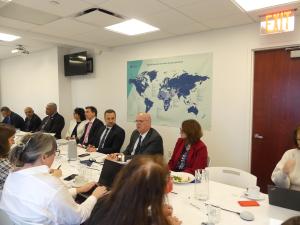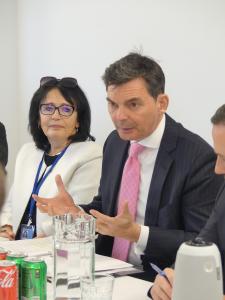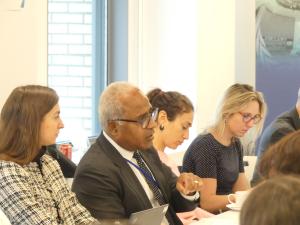The Pacific Islands Region covers a vast territory of ocean expanse roughly the size of Africa. Its 13 countries consist of thousands of scattered islands, whose wellbeing and livelihoods depend heavily on a safe and peaceful maritime environment. Yet porous maritime borders, as well as a small and dispersed geography and population, leave the region vulnerable to multiple security challenges, and troublingly, the Pacific Ocean remains the largest unpoliced space in the world.
The working lunch entitled, “Multilateral Approaches to Maritime Security Challenges in the Pacific Islands Region: Outlook and Opportunities for Partnership”, gathered diverse stakeholders to discuss multilateral approaches to maritime security in the Pacific Islands region, given the increasing importance of maritime activity seen in the region.
Participation was seen from the Permanent Missions of Australia, Bulgaria, Cyprus, Denmark, Fiji, France, Greece, Japan, New Zealand, Norway, the Philippines, Portugal, the European Union Delegation, as well as United Nations entities (CTED, DCO, DESA, UNCTAD, UNDP, UNODC, UNIDIR) and think tanks (Asia Society Policy Institute).
Discussions highlighted the following takeaways:
- Linkages between blue crime, armed conflict and extremism in the maritime domain are a growing trend. Further, mega-trends such as climate change, digitalization and the expansion of maritime activity and trade (the so-called blue acceleration, or the industralization of the maritime domain) will continue to shape multilateral maritime cooperation in the future.
- Maritime security is deeply interconnected with security, environmental and economic development, and thereby a holistic approach to maritime governance is needed. Attention was brought to protecting subsea data cables which are vital for securing connectivity and economic growth in the Pacific region, and ultimately to achieving the SDGs.
- The UN would benefit from a strategic approach to maritime security and ocean governance more broadly and better coordination of its activities. Several UN entities address oceans in terms of environmental protection, pollution, or economic development, however there is no dedicated agency mandated to address maritime peace and security concerns.
- Partnerships between the Pacific Island States and its global partners, such as the EU and Australia, are key.
- There is a need to enhance inter-regional exchange and dialogue on maritime security challenges to promote learning on shared challenges. Regional organizations such as the Pacific Islands Forum and the EU also play an important and strategic role in the Pacific.
- Call for a holistic approach to maritime security within the United Nations Security Council, especially in light of the incoming Council members such as Greece in 2025. The notion of a "maritime Security Council" was raised, considering the upcoming opportunities to raise the profile of maritime issues on the Council this coming year.





